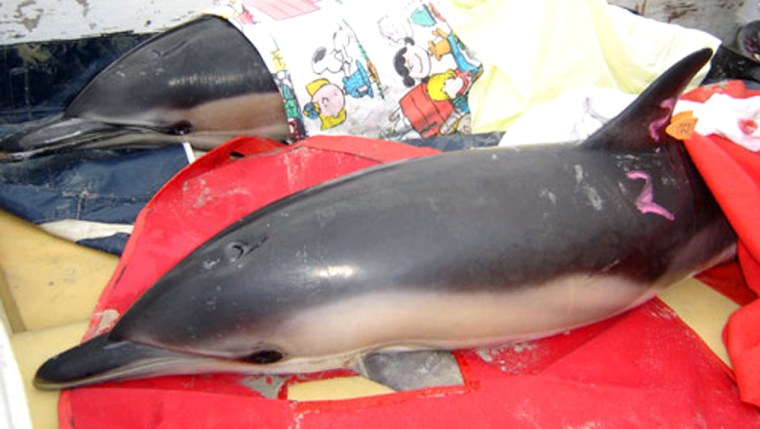Scientists are struggling to explain the stranding of 31 dolphins and a pilot whale off the coast of Massachusetts since the start of the year, including some found with brain deformities or chronic diseases.
Eight Atlantic White-sided dolphins were found Tuesday, following 23 dolphins, a pilot whale and a seal discovered since Jan. 1 in the hook-shaped Cape Cod region and its maze of sandbars and marshes that are a magnet for tourists in summer.
The number is unusually high, according to the Cape Cod Stranding Network that oversees rescue efforts. It typically averages 200 rescues a year, compared to 31 rescues performed in the last 10 days alone.
At least 14 of the dolphins have died, including two which were euthanized, the network said. The strandings involved Atlantic White-sided dolphins and so-called common dolphins, neither of which are endangered.
Scientists say it's unclear why so many of the dolphins have been stuck. About 100 dolphins beached themselves in roughly same area on Cape Cod over six weeks last winter.
Warm water a factor?
Sarah Herzig, who oversees rescue work at the CCSN, said they may have become beached during a recent full moon that affects tides or that unseasonably warm water could have affected the migration of fish that they typically feed on.
Initial studies showed some suffered chronic diseases.
Katie Pugliares, who dissects dolphins at the CCSN to determine how they died, said she had seen a range of chronic diseases including peritonitis, or fluid buildup in the intestinal cavity, and lymph node inflammation.
She also found chronic brain deformities and brain lesions, which could have been caused by encephalitis, parasites or bacterial infection of the brain.
Pugliares added that it cannot be known for sure which infections caused the animals to die until pathology results return from the laboratory, which can take weeks or months.
She declined to specify how many of the dissected animals suffered from the conditions she found but added that the diseases may have been a result of being stranded instead of actually causing the mammals to beach themselves.
"Sometimes the ones that die have symptoms associated with strandings because when they strand, they become sick," she said.
Some females pregnant
Herzig said some of the pregnant females which rescue workers are trying to save were faring poorly.
Tony LaCasse, spokesman for the New England Aquarium, said marine biologists are finding that some of the dolphins are suffering from underlying conditions different from previous years but that the strandings were still being studied.
"If animals are under food stress, it might be opportunistic for certain infections to take hold," he said.
He added that some kind of viral outbreak, environmental conditions and bacteria in the water could have also been contributing factors.
Dolphins typically exhibit empathetic behavior by not leaving sick dolphins in their school behind, and this also may explain why so many became stuck, LaCasse and other scientists contacted by Reuters said.
The stranding network urged anyone spotting more stranded marine mammals in the Cape Cod area to call 1-508-743-9548 .
